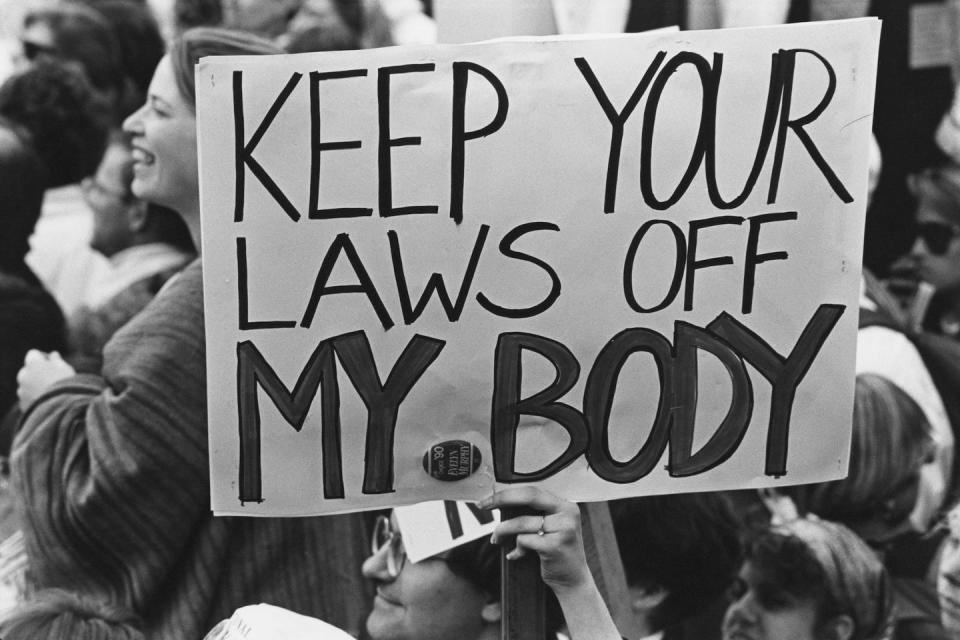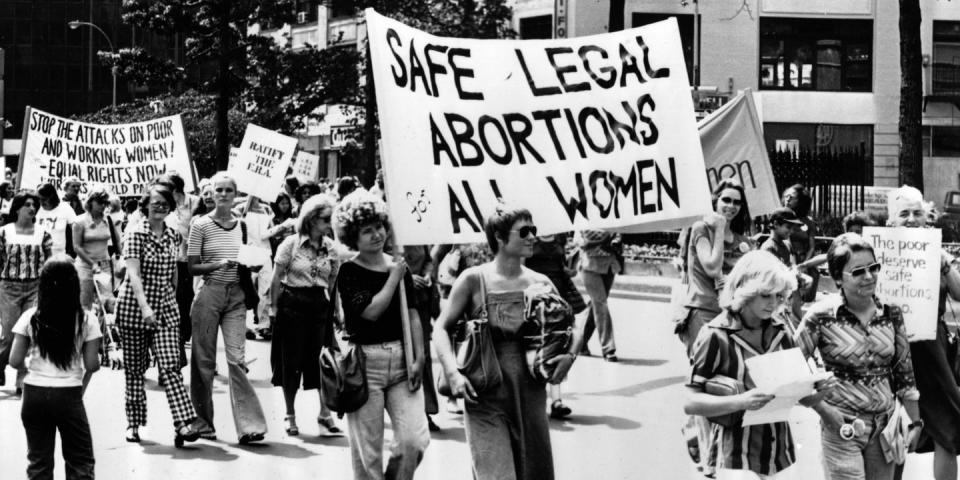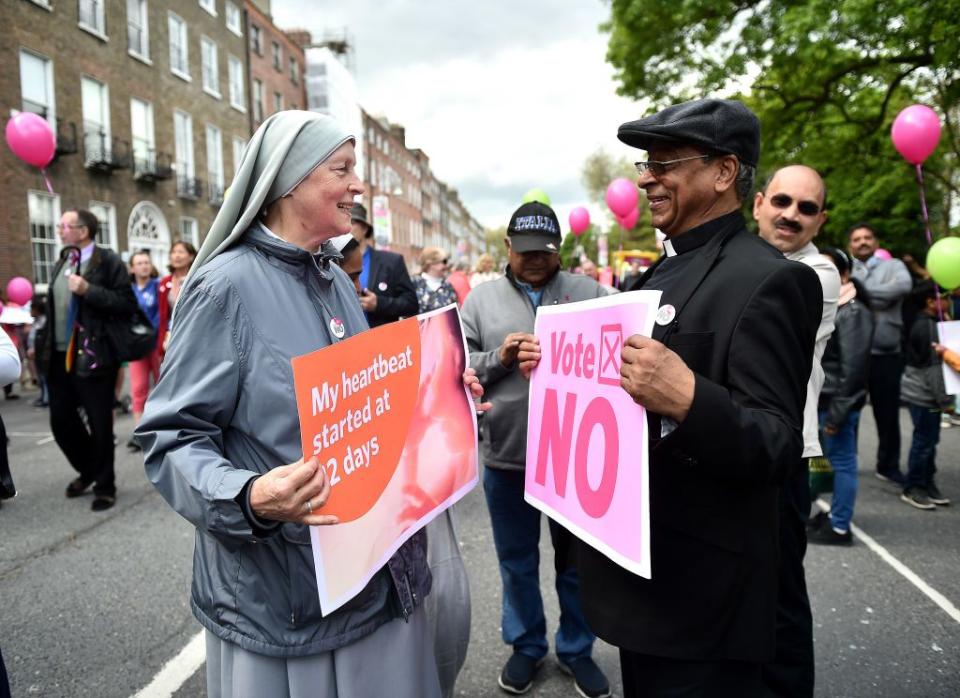I Aborted At 16. Now I'm Flying #HomeToVote.

It started with a year-long relationship, a broken condom, and an ineffective morning after pill.
Now Jane was 16 and pregnant. In a rural Irish village, hours drive from the nearest town, in a country where abortion was illegal even in rape or incest cases, her options were limited.
"Up until that moment we’d been sort of playing adults and the minute that that happened we were straight back to being kids again. We had no idea what to do, where to access things, where to get help, who to speak to."
It didn’t help that Jane’s boyfriend was controlling and abusive. Her memories have faded, through time and trauma, but she remembers him throwing a heavy object at her stomach in a moment of rage, shortly after she confirmed her worst fears.

A teenager, known for her quirky outspokenness but desperately shy inside, she remembers folding away from him and in on herself. There were days lying in the sick room in her Catholic school, curled in a ball, sleeping or static because of the lethargy and dizziness that enveloped her.
"It was very apparent what was wrong. The panic, the terror, feeling alone."
One morning, she realized she couldn’t get out of bed. That was when Jane told her mother the truth. "I'm honestly missing parts of my memory from how that went. It took me a long time to realize that there’s a reason I don’t remember parts of that storm."
Jane is just one of the Irish women reliving her own crisis pregnancy and subsequent termination ahead of Friday’s national referendum, which will see Irish people decide whether to remove a constitutional ban on abortion.
Now a UK resident, Jane asked to go by her middle name because she’s afraid for her family, who still live in the same rural Irish village she grew up in, a place where "there’s a post office, a church and a pub and that’s it," and neighbors gossip relentlessly.
Ireland also doesn’t have a diaspora vote, so Jane is one of an unknown number of Irish women now retracing the journey they made for an abortion in reverse. Her trip home was funded through a Facebook group, Abroad for Yes, where supporters donate money to get their countryfolk back to cast their ballots.
"There’s no way I wouldn’t make the journey," she says.
Three years ago, Ireland became the first country in the world to legalise gay marriage by referendum. But, on the ground, there’s a feeling that this vote is a lot more challenging.
"With the marriage referendum it was so visible, everybody knew somebody. It became normalized for a lot of people whereas with this the shame and the secrecy does so much damage to people."
This makes little sense when as many as 12 women travel to the UK every day for abortions. An average of 20 teenagers travel to England and Wales each month, according to figures from the British Department of Health. As many as three a day buy abortion pills online, take them at home, sometimes alone without anyone to call if something goes wrong. However, they’re risking a 14 year prison sentence just by doing so.
Jane remembers her parents’ panic that the neighbours would find out about her abortion and they’d be ostracised. She can’t recall if her parents asked her whether she wanted to go through with the pregnancy, it didn’t really seem like an option.
"I was far too young to have any notion about what I wanted to do with my life, let alone whether I wanted to become a young mother or not."
Her mother was too upset to come, so Jane flew to England with her stoic father. Arriving at the abortion clinic, "I remember the building itself was like a redbrick building. I was expecting it to look more like a doctor’s surgery. From the outside it looked more like a home."

The pair returned to Ireland the same day, and the family never again spoke about Jane’s abortion. Without her parents, though, Jane said she wouldn’t have had the strength to travel, and financially it would have been impossible.
Her 16-year-old boyfriend wasn’t involved in either the decision or the journey.
"He wasn’t asked to contribute to anything, he didn’t have to go with me," she says.
Jane said she felt resentful about that, but also wonders whether his powerlessness and isolation may have contributed to his aggression. Two days after she got back from England, Jane sat her Junior Cert, the Irish equivalent of the GCSEs.
"I went into school still bleeding from the procedure and literally nobody knew," she says. "I went on to college. The life I live now is something I never would have been able to if I didn’t have the abortion. And I feel completely ok with that, but what’s causing the issue now is the silence and the guilt."
To this day, less than ten people know Jane’s story. "It’s such a shame culture we have around the procedure and the travel and the whole thing," she says. "And it’s an Irish Catholic thing around sex and being sexually active, which is not something you talk about. For me, growing up in Ireland I was surrounded by nuns, I was Catholic-born, I was in Catholic school, it was everywhere, you couldn’t get away from it, and it’s still very hard to walk away from that."
Of the 'no' voters now lining Dublin’s streets, going house to house in rural areas and prominent in the media, Jane says "it’s like a privilege where they’ve never had to battle for their right to access healthcare, they’ve never had to think about what they would do…A lot of them have had freedom of movement as well so they can’t conceive of a situation where they may get pregnant and be unable to leave the country."

Jane’s been campaigning on the pro-choice side for a year, but it’s taken a toll. "I’ve had to mind myself and be careful to look after my mental health during this. It is a draining subject and it is draining talking to people who are no voters coming out with ridiculous statements."
Some of her Irish friends have been avoiding their home regions, traveling to different parts of the country instead and going door-to-door asking for a "yes" vote.
Jane says she never expected to see this vote in her lifetime, and she’s desperately hoping the Constitution is changed to allow choice for women.
"You can be anti-abortion and still vote for yes, you can be Catholic and still vote for yes," she says.
And to young, terrified and vulnerable women who find themselves in the same position as her, she offered advice: "You’re not on your own, there are people who can help you financially, get you counseling, get you options, because there are options out there. You just need to tell somebody sooner rather than later."
You Might Also Like

